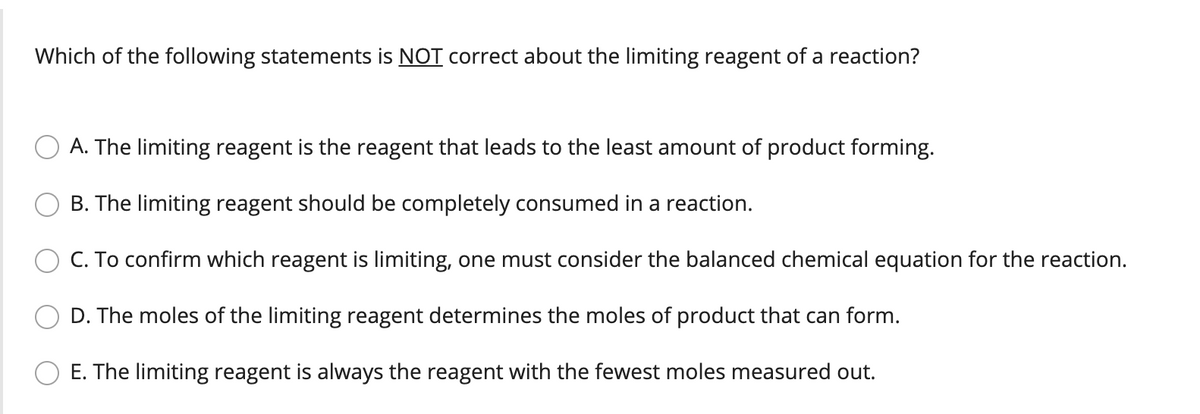Which of the following statements is NOT correct about the limiting reagent of a reaction? A. The limiting reagent is the reagent that leads to the least amount of product forming. B. The limiting reagent should be completely consumed in a reaction. C. To confirm which reagent is limiting, one must consider the balanced chemical equation for the reaction. D. The moles of the limiting reagent determines the moles of product that can form. E. The limiting reagent is always the reagent with the fewest moles measured out.
Which of the following statements is NOT correct about the limiting reagent of a reaction? A. The limiting reagent is the reagent that leads to the least amount of product forming. B. The limiting reagent should be completely consumed in a reaction. C. To confirm which reagent is limiting, one must consider the balanced chemical equation for the reaction. D. The moles of the limiting reagent determines the moles of product that can form. E. The limiting reagent is always the reagent with the fewest moles measured out.
Introductory Chemistry: An Active Learning Approach
6th Edition
ISBN:9781305079250
Author:Mark S. Cracolice, Ed Peters
Publisher:Mark S. Cracolice, Ed Peters
Chapter8: Chemical Reactions
Section: Chapter Questions
Problem 1E: Consider the following particulate-level representation of a chemical equation: The white spheres...
Related questions
Question

Transcribed Image Text:Which of the following statements is NOT correct about the limiting reagent of a reaction?
A. The limiting reagent is the reagent that leads to the least amount of product forming.
B. The limiting reagent should be completely consumed in a reaction.
C. To confirm which reagent is limiting, one must consider the balanced chemical equation for the reaction.
D. The moles of the limiting reagent determines the moles of product that can form.
E. The limiting reagent is always the reagent with the fewest moles measured out.
Expert Solution
This question has been solved!
Explore an expertly crafted, step-by-step solution for a thorough understanding of key concepts.
This is a popular solution!
Trending now
This is a popular solution!
Step by step
Solved in 2 steps

Knowledge Booster
Learn more about
Need a deep-dive on the concept behind this application? Look no further. Learn more about this topic, chemistry and related others by exploring similar questions and additional content below.Recommended textbooks for you

Introductory Chemistry: An Active Learning Approa…
Chemistry
ISBN:
9781305079250
Author:
Mark S. Cracolice, Ed Peters
Publisher:
Cengage Learning

World of Chemistry, 3rd edition
Chemistry
ISBN:
9781133109655
Author:
Steven S. Zumdahl, Susan L. Zumdahl, Donald J. DeCoste
Publisher:
Brooks / Cole / Cengage Learning

Introductory Chemistry: A Foundation
Chemistry
ISBN:
9781337399425
Author:
Steven S. Zumdahl, Donald J. DeCoste
Publisher:
Cengage Learning

Introductory Chemistry: An Active Learning Approa…
Chemistry
ISBN:
9781305079250
Author:
Mark S. Cracolice, Ed Peters
Publisher:
Cengage Learning

World of Chemistry, 3rd edition
Chemistry
ISBN:
9781133109655
Author:
Steven S. Zumdahl, Susan L. Zumdahl, Donald J. DeCoste
Publisher:
Brooks / Cole / Cengage Learning

Introductory Chemistry: A Foundation
Chemistry
ISBN:
9781337399425
Author:
Steven S. Zumdahl, Donald J. DeCoste
Publisher:
Cengage Learning

Chemistry: Matter and Change
Chemistry
ISBN:
9780078746376
Author:
Dinah Zike, Laurel Dingrando, Nicholas Hainen, Cheryl Wistrom
Publisher:
Glencoe/McGraw-Hill School Pub Co

Chemistry: An Atoms First Approach
Chemistry
ISBN:
9781305079243
Author:
Steven S. Zumdahl, Susan A. Zumdahl
Publisher:
Cengage Learning

Chemistry
Chemistry
ISBN:
9781305957404
Author:
Steven S. Zumdahl, Susan A. Zumdahl, Donald J. DeCoste
Publisher:
Cengage Learning